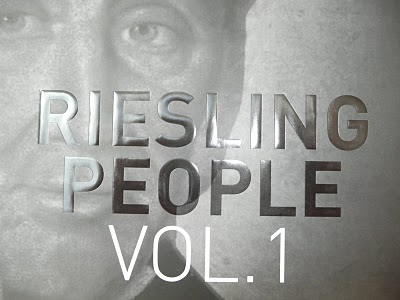
People knock around this notion that wine has a soul, and that wine-makers are heroic figures for bringing that soul forward. The photograph of the ruggedly tan vineyard owner with his hands outstretched toward the camera, offering up a bunch of dusty grapes, is so cliché by now, that I can even picture the loyal golden retriever at his feet.
Given this over-exposure of wine enthusiasts to a particular image of wine-making, one wonders what’s left to say or show about the process of growing, drinking and selling wine. How does a wine-maker tell his or her story without seeming pompous, trite, or cookie-cutter?
For the past 2 decades, wine-maker Martin Tesch has been following the tune of his own guitar, quite literally, when it comes to his business model. At a time when German Riesling was being sold in respectable bottles, with respectable labels, at punishing prices, Tesch decided to sell screw cap bottles, using a series of quirky black-and-white photos for the labels, and he sold them for half the price of his competitors. The backlash from those decisions were immediately felt. Wine shops all over Germany and Austria stopped carrying his product, and even wrote threatening letters to Tesch, insinuating that he was some sort of hooligan school-boy and certainly not a serious wine-maker. But Tesch was blasé about these setbacks. He knew his wine was too good to become extinct, and so he stuck to his guns.
“If you don’t get, you don’t get it,” is perhaps a good summation of Tesch’s wine-making style, and if this seems like the sort of line that you’d expect a rock star to throw out, then you are not far off. What do you call a man who loves nothing more than wine and Gibson guitars, if not a rock star? With his new book, Riesling People Vol. 1, Tesch has added to his rock star persona by delivering a document that is more reminiscent of a Rolling Stones tour diary, than a series of wine tastings. With no introduction, forward, or really any writing at all, Tesch cryptically constructs a recent montage of his Rolling Riesling Show. These events, in which guests were treated to a live concert (using only Gibson guitars, of course), along with a tasting of the five latest Rieslings from the Tesch Estate, took place in locations all over Germany. The book captures countless moments of real enjoyment and candid fun. Even the photos of the bottles themselves look fresh and unguarded. It’s as if they are relieved not to have to stand in their usual stoic position next to a perfectly poured glass, capturing the wine in just the right light. These wines, and the people who drink them, have finally been given permission to relax. Although there aren’t any descriptions of the terroir, and very few photos of the vineyard itself, I believe that looking through this book is a fairly accurate visual interpretation of Tesch’s wine making style. His wines are playful, unpretentious, but most of all….Soulful.
